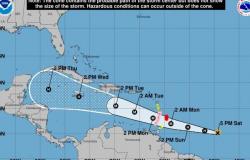The vitamin D It is known for its many health benefitsranging from strengthening bones and muscles to robust heart function. However, a lack of this vitamin can trigger various diseases. The main source of vitamin Vitamin D is sun exposuresince the sun’s rays help synthesize this vitamin in the skin, promoting the growth of strong bones and cognitive health, according to the Mayo Clinic.
However, a lack of vitamin D can cause significant health problems. “We see a lot of associations between vitamin D deficiency and poor health outcomes,” he says. Mary Byrneassociate professor of the Loyola University in Chicagowho researched this vitamin extensively.
The most common symptoms of vitamin D deficiency include bone pain, muscle weakness, fatigue and mood swingsaccording to Cleveland Clinic. Although many factors can influence these symptoms, if there has been no recent change in lifestyle, it could be a sign of vitamin deficiency. In this case, it is recommended to consult a primary care provider.
“Because vitamin D is not found in many foods and sun exposure can be limited depending on where you live, I recommend everyone get their vitamin D levels checked at their annual checkup,” she says. Sarah Gold Anzlovar, dietitian in private practice in the area of Boston.
Additionally, certain groups of people are at higher risk for low vitamin D levels. This includes dark-skinned individuals, people with certain underlying health conditions, those taking certain medications and those living farther from the equator, according to the Cleveland Clinic.
Not getting enough vitamin D can increase your risk of various diseases and conditions, some of them life-threatening. These are ten possible complications related to a lack of vitamin D:
Some research has suggested that vitamin D supplements may help prevent or control COVID-19. Although these studies are in early stages, previous research indicates that vitamin D may protect against respiratory diseases.
A study that analyzed data from 25 clinical trials found that people who took vitamin D were 12% less likely to develop respiratory diseases, such as pneumonia, bronchitis, and sinusitis. However, the results regarding the relationship between vitamin D and the flu have been contradictory.
One of the main functions of the Vitamin D is to maintain bone health. According to Harvard Health PublishingLow levels of vitamin D can cause low calcium stores in bones, increasing the risk of fractures. Vitamin D deficiency can lead to osteoporosis, a condition where the loss of old bone occurs more rapidly than the generation of new bone, according to the Mayo Clinic.
There is research suggesting a link between vitamin D deficiency and depression. One study found that vitamin D supplementation helped improve mood in women with type 2 diabetes. Another meta-analysis indicated that vitamin D supplements may be as effective as antidepressant medications in some cases.
Schizophrenia, a serious brain disorder, may be linked to vitamin D deficiency. A review of research suggests that people with vitamin D deficiency are twice as likely to be diagnosed with schizophrenia.
A study published in the journal Neurology found that moderate and severe vitamin D deficiency in older adults was associated with a doubled risk of some forms of dementia, including Alzheimer disease.
Research points to a relationship between low levels of vitamin D and diabetes. Some studies suggest that the Vitamin D improves insulin sensitivity and reduces chronic inflammation, factors associated with type 2 diabetes.
A study found a link between low blood levels of vitamin D and aggressive prostate cancer, especially in men. african americans.
One small study found that men with severe erectile dysfunction (ED) had significantly lower vitamin D levels than those with mild ED.
Numerous studies have shown an association between low levels of vitamin D and heart disease, although it has not yet been clearly established that supplementation reduces these risks.
The deficiency of Vitamin D has also been associated with an increased risk of breast cancer. One review found that “most studies on vitamin D support an inverse association between vitamin D status and breast cancer risk.”
Getting enough vitamin D can be easy with the help of supplements or safe sun exposure. It can also be consumed through food, although the options are limited. “Vitamin D is found naturally in few foods, although some foods are enriched with it”explains Anzlovar.
For example, salmon is one of the best food sources of vitamin D. According to the U.S. Department of AgricultureA 3-ounce serving of salmon provides 60% of the daily value of vitamin D. Egg yolks, and fortified products such as milk, cereal, and orange juice can also help meet daily requirements.






